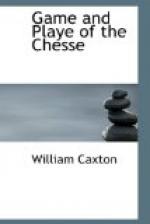is so noble a thynge that were as she is she wyll susteyne
and kepe/ but this rewle of nature hath fayllid longe
tyme/ how well that the decree sayth that alle the
thynges that ben ayenst the lawe of nature/ ought
to be taken away and put a part And he sayth to fore
in the .viii. distinction that the ryght lawe of nature
differenceth ofte tymes for custome & statutes establisshid/
for by lawe of nature all thinge ought to be comyn
to euery man/ and this lawe was of old tyme And men
wene yet specially y’t the troians kept this
lawe And we rede that the multitude of the Troians
was one herte and one sowle/ And verayly we fynde
that in tyme passid the philosophres dyde the same/
And also hit is to be supposyd that suche as haue
theyr goodes comune & not propre is most acceptable
to god/ For ellys wold not thise religious men as monkes
freris chanons obseruantes & all other auowe hem &
kepe the wilfull pouerte that they ben professid too/
For in trouth I haue my self ben conuersant in a religio’9
hous of white freris at gaunt Which haue all thynge
in comyn amonge them/ and not one richer than an other/
in so moche that yf a man gaf to a frere .iii. d or
.iiii. d to praye for hym in his masse/ as sone as
the masse is doon he deliuerith hit to his ouerest
or procuratour in whyche hows ben many vertuous and
deuoute freris And yf that lyf were not the beste
and the most holiest/ holy church wold neuer suffre
hit in religion And acordynge thereto we rede in plato
whiche sayth y’t the cyte is well and Iustely
gouernid and ordeyned in the whiche no man maye saye
by right, by cuftome. ne by ordenance/ this is myn/
but I say to the certaynly that syn this custome cam
forth to say this is myn/ And this is thyn/ no man
thought to preferre the comyn prouffit so moche as
his owen/ And alle werkemen ought to be wise & well
aduysyd so that they haue none enuye ne none euyll
suspecion one to an other/ for god wylle that our humayne
nature be couetous of two thynges/ that is of Religion.
And of wysedom/ but in this caas ben some often tymes
deceyued For they take ofte tymes religion and leue
wisedom And they take wysedom and reffuse religion
And none may be vraye and trewe with oute other For
hit apperteyneth not to a wyse man to do ony thynge
that he may repente hym of hit/ And he ought to do
no thynge ayenst his wyll/ but to do alle thynge nobly,
meurely. fermely. and honestly And yf he haue enuye
vpon ony. hit is folye For he on whom he hath enuye
is more honest and of more hauoir than he whiche is
so enuyous/ For a man may haue none enuye on an other/
but be cause he is more fortunat and hath more grace
than hym self/ For enuye is a sorowe of corage y’t
cometh of dysordynance of the prouffit of another
man And knowe thou verily that he that is full of bounte
shall neuer haue enuye of an other/ But thenuyous
man seeth and thynketh alleway that euery man is more
noble/ And more fortunat that hymself And sayth alleway
to hymself/ that man wynneth more than I/ and myn neyghebours




